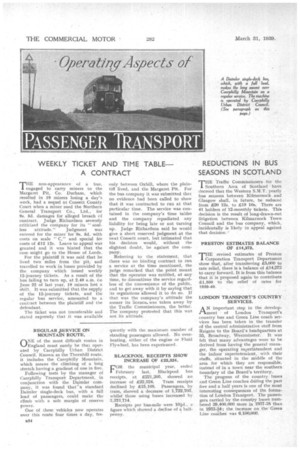WEEKLY TICKET AND TIME TABLEA CONTRACT
Page 112

If you've noticed an error in this article please click here to report it so we can fix it.
'r HE non-appearance of a bus, engaged to carry miners to the Margaret Pit, Co. Durham, which resulted in 19 miners losing a day's work, had a sequel at Consett County Court when a miner sued the Northern General Transport Co., Ltd., for 9s. 5d. damages for alleged breach of contract. Judge Richardson severely criticized the company for its " soulless attitude." Judgment was entered for the miner for 9s. 5d. with costs on scale " C," and special fee costs of £12 12s. Leave to appeal was granted and it was hinted that the case might go to the House of Lords.
For the plaintiff it was said that he lived two miles from the pit, and travelled to work in buses provided by the company which issued weekly 12-journey tickets. As a result of the bus failing to turn up, at 2.40 a.m. &a June 22 of last year, 19 miners lost a shift. It was submitted that the supply of the 12-journey tickets, and the regular bus service, amounted to a contract between the plaintiff and the defendant.
The ticket was not transferable and stated expressly that it was available only between Oxhill, where the plaintiff lived, and the Margaret Pit. For the bus company it was submitted that no evidence had been called to show that it was contracted to run at that particular time. The service was contained in the company's time tables and the company repudiated any liability for being late or not turning up. Judge Richardson said he would give a short reserved judgment at the next Consett court, but intimated that his decision would, without the slightest doubt, be against the company.
Referring to the statement, that there was no binding contract to run a service at the time mentioned, the judge remarked that the point meant that the operator was entitled, at any time, to discontinue the service regardless of the convenience of the public, and to get away with it by saying that its regulations allowed it to do so. If that was the company's attitude the sooner its licence, was taken away by the Traffic Commissioners, the better. The company protested that this was not its attitude.
























































































































































